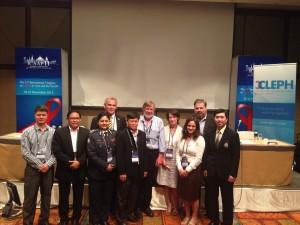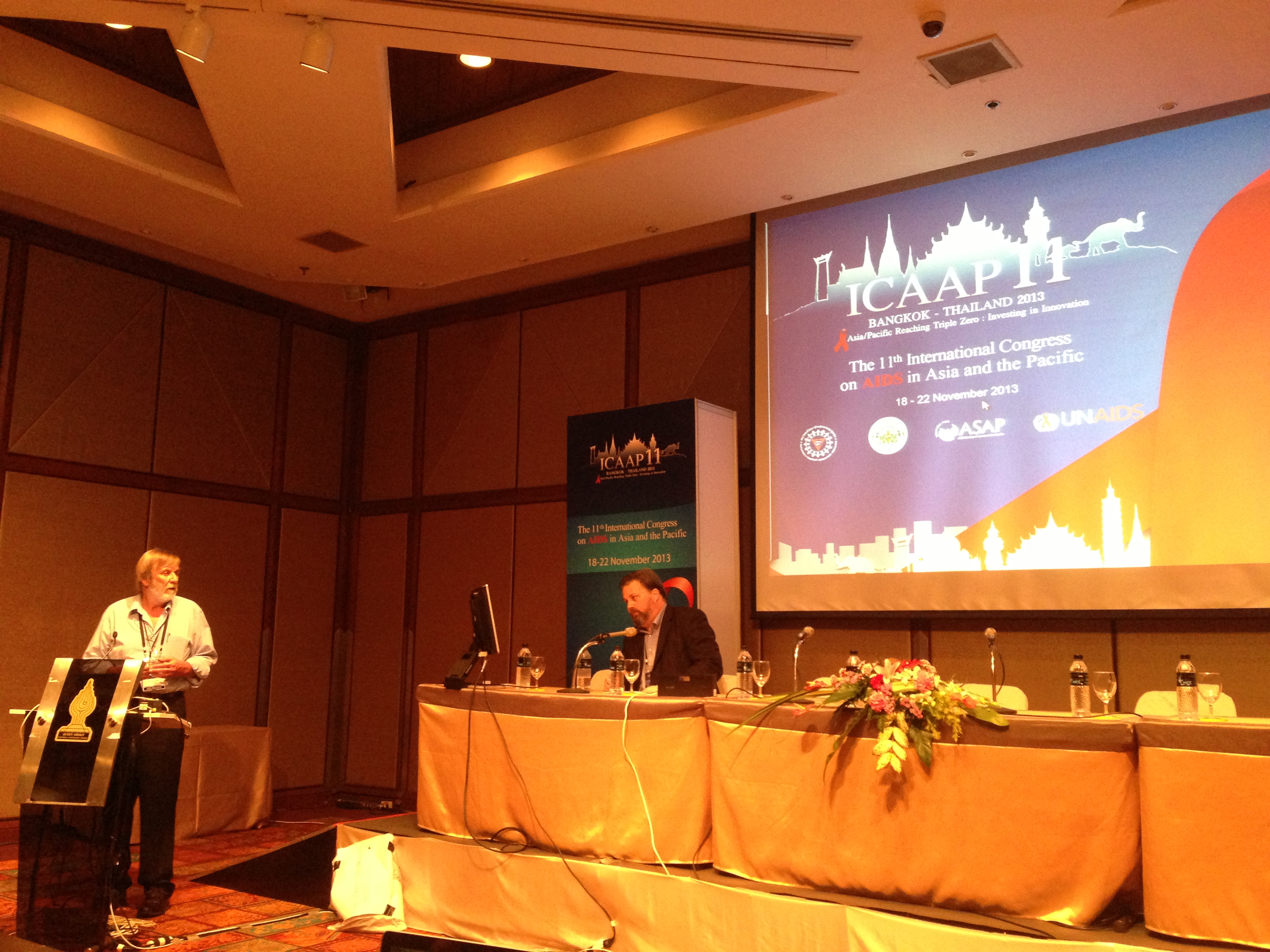Police have a critical role in harm reduction; firstly, evidence of the impact of police activity on the willingness of potential clients to access services is irrefutable – both positive and negative. Secondly, police predominance means officers are perfectly positioned to advocate to the community and legislators in support of harm reduction approaches. Appropriately, the subject of ‘Developing Police Leadership in the HIV Response’ was featured in a satellite session at the 11th International Congress on AIDS in the Asia Pacific hosted by Bangkok in November 2013 to highlight the importance of police influence in preventing HIV.
The session was hosted by the Centre for Law Enforcement and Public Health and the International Development Law Organization.
Senior police from the region spoke about progress being made in their respective law enforcement organisations to adapt policing approaches to better support harm reduction programs. Police Lieutenant Colonel Krisanaphong Poothakool of the Royal Thai Police said it was a challenge to encourage police to support harm reduction because many police regarded drug users as criminals. Despite this challenge, he said it was “important to train police about harm reduction to educate them about their public health role in preventing HIV”. Pol. Lt. Col. Krisanaphong – who has two PhDs and is a lecturer at the Royal Thai Police Cadet Academy – is working towards developing a curriculum for harm reduction to train all police recruits.
Presentation: Policing and Harm Reduction in Thailand

CLEPH-IDLO Satellite Session at ICAAP11 on Police Leadership in the Response to HIV: Lam Tien Dung, Budyo Prasetyo, Mily Biswas, Leo Kenny, Neak Yuthea, Nick Crofts, Fabienne Hariga, Ayesha Mago, Jason Eligh and Krisanaphong Poothakool.
Law enforcement representatives, Brig. Gen. Budyo Prasetyo (National Narcotics Control Board) and Lt. Col. Lastri Rinyanti (Indonesian National Police) from Indonesia, highlighted the important nexus between harm reduction programs and police officer occupational health and safety. Reducing HIV among the community, particularly vulnerable populations with whom the police frequently come into contact with, results in greater police protection from HIV transmission due to needle-stick injuries.
Presentation: Indonesian Police and Narcotics Board Response to HIV and Drug Use
The ICAAP11 satellite session focused on developing leadership skills and building capacity for police to become informed and engaged about the police role in harm reduction. Maj. Gen. Neak Yuthea from Cambodia said that whilst technical skills were important to improving harm reduction services, employing ‘adaptive leadership’ skills was essential to convince and persuade otherwise unresponsive government and law enforcement staff to endorse and actively support harm reduction approaches.
Presentation: Police as Collaborative Leaders in Responding to HIV in Key Populations
Training police about human rights features heavily in the training program of the Dhaka Metropolitan Police, Bangladesh, according to Additional Police Commissioner Mily Biswas. Police training also addresses issues of humanitarian laws, gender, responsive community policing and reproductive health paying particular attention to the broad range of groups vulnerable to HIV transmission.
Presentation: Bangladesh Police in the Response to HIV
Police officer and lecturer at the People’s Police Academy (PPA) in Vietnam, Mr Lam Tien Dung, revealed the recent steps his Academy was taking to implement a harm reduction curriculum. A number of PPA lecturers underwent training in public health leadership, subsequently a working group was established to implement the new approaches and to guide new partnerships with civil society organisations. Mr Dung also said that, “As an educational institution, the role of the People’s Police Academy is to provide excellent quality, evidence-based education to police – in both recruit and in-service training phases – in collaboration with key stakeholders, to improve the police role in the HIV response”.
Presentation: Police Leadership in the HIV Response in Vietnam
The UNAIDS and UNODC Bangkok offices were co-organisers of the satellite session. UNAIDS Bangladesh Country Co-ordinator, Leo Kenny, also spoke about the critical need for police to be regarded as partners in the fight to prevent HIV and not cast as enemies – as has largely been the case. Mr Kenny recommended that guidance be provided to National AIDS Programs to give harm reduction practitioners the confidence and ability to successfully build partnerships with law enforcement agencies and to establish “a common language, common goals and to change police culture, based on a thorough review of successful collaborations and an understanding of the principles of successful partnership”. Also presenting in the satellite session was Dr Fabienne Hariga who gave an overview of a new program at UNODC regarding efforts to establish relationships between police and civil society organisations in the region. A number of meetings had taken place between senior police and civil society with commitments from stakeholders to work together to prevent HIV.
In July 2014, the International AIDS Conference will be held in Melbourne, Australia. LEAHN is preparing to showcase collaborative efforts between police and harm reduction programs and further highlight that police can be part of the solution, not just part of the problem in HIV prevention.




The Indonesia PDF does not display.
Wellbourne-Wood D 1999 “Harm reduction in Australia: some problems putting policy into practice”, International Journal of Drug Policy, 10:5, pp. 403–13.The potential of Australia’s national harm minimisation policy to guide intervention has been weakened by a number of forces. This paper examines these and other related obstacles to the implementation of harm reduction strategies. Some suggestions are made in relation to how Australia’s harm minimisation policy could more effectively help guide both government and non-government intervention in the drug field.